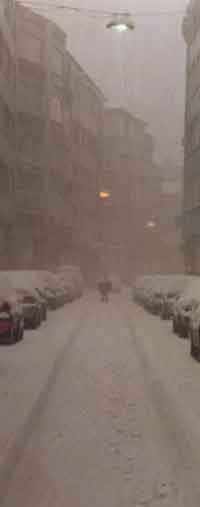|
|
|
|
|
|
|
|
|
|
|
|
|
|
|
 Steve Silkin
Steve SilkinEnd of the Line on the Warsaw Tram I was in Poland as one of the worst European winters in years set in. The freeze dipped to 28 below Centigrade by New Year's Eve. I had spent the day walking from store to store looking for mayonnaise to bring to Eva's party. At the first grocery shop where I stopped, the aisles had only bare shelves, except for one toward the back, which displayed a couple of stacks of sardine tins. The scene was much the same at five or six other shops. Without the mayonnaise, I trudged through the snow back to the apartment where I was staying. It was Isa's place. I'd met her in London during the summer and she invited me to stop by as I traveled through Europe. I was 21 and I had nothing better to do. For propriety's sake, Isa was staying at her parents' place across town while I was at her apartment, so she swung by to take me to the party. When she walked through the door she was practically sobbing, the cold was so painful. She had to do a little dance to thaw out her feet. I wondered if we shouldn't stay in, but she said in Warsaw the cold was no excuse to bow out of an invitation. The freeze had sent all the cab drivers home, but wildcatters were out in force, charging double the going rate. We hopped into some unheated heap and sped through the city. I was losing the feeling in my feet. While we made it to the party without frostbite, we were so cold and tired that we barely enjoyed ourselves. We drank Polish vodka with Eva and her friends. One of the guys there asked me what words I'd learned in Polish during my visit. "Entropia," I told him. He was impressed. "But do you know what it means?" he asked. "Yes," I said. "Ah," he said, "but you don't know exactly what it means." Which was a pretty good one. Then the vodka kicked in and I fell asleep on the couch. Isa said the party went on for a while longer, then everybody followed my lead. I woke up at noon the next day and Isa and I walked through snowdrifts across the west side of Warsaw, a moonscape except for the uniform 10-story monolithic apartment blocks that stretched out to the horizon. We had dinner with Isa's folks. Her dad asked me about American guns. I told him what I knew — I had a friend who owned a .357 Magnum, and as a Boy Scout I learned to shoot with a .22 repeater rifle — which wasn't much. But he was interested anyway. "Americans have good guns," he said. After dinner Isa and her father walked me down to the tram stop so I could head back to her place. We waited as the night cold bit into our skin. After a few minutes, a tram came, but it was heading in the other direction. Isa and her dad pulled me across the road and pushed me through the tram doors, which opened with a hydraulic boosh. Isa said I'd be warmer taking a ride to the end of the line than if I stood there and waited for the tram to come back. They told me to stay on board once the tram reached the terminal even though the conductor would ask me to get off. I tried to follow their advice, but I couldn't. The conductor grabbed me by the arm, walked me to the door, pushed me out, and shut the tram lights. And as far as I could tell, left me standing there to freeze to death. I didn't know where I was. I didn't speak the language. And it was colder than I ever imagined it could be. I stood there alone, in the subzero temperature, wondering: Was this the last tram of the day? And if that was the case, how would I get to someplace warm before I died? I was raised religious. But somehow, there at the end of the line of the Warsaw tram, I didn't pray to be saved and I didn't question whether I was being punished for my sins. I was just overcome by a profound sadness, a pure, deep sense of loss. I think I was mourning for my own life. Which, as it turned out of course, wasn't in any danger. Over the next few minutes, one by one, five or six other cross-town commuters each made their way through the snow to the tram stop. This meant that the tram would be leaving soon, carrying me back to Isa's apartment block that towered above the Lenin Museum. When I got there, the elevator wasn't working, so I had to walk up eight flights of stairs. When I opened the door to Isa's place, I realized that the central heating had stopped working and snow had seeped through the cracks of the balcony windows and formed drifts against them on the living room floor. But at least I wasn't outside. I wasn't overjoyed, or even grateful. I'm not sure I was even relieved. I think I've carried a little bit of the sadness I felt at the tram stop on the New Year in Warsaw with me for the rest of my life. And I feel it whenever I hear about a friend, an acquaintance or even someone I don't even know dying suddenly, unexpectedly. But I don't know exactly what it means. |